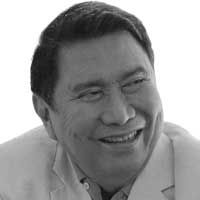Fairness and objectivity

When reports of early election returns showed Bongbong Marcos leading candidate Leni Robredo by a mile were being aired, three TV anchors showed their displeasure by grimacing.
We don’t take sides, favor anyone or lie. Our service is genuine, goes the TV mantra.
The mantra or motto translates to the journalist’s tenets of fair play, objectivity, truthfulness and public service.
If these three obvious bigots of broadcast journalism were with CNN, they would have been suspended for months or reassigned to a non-news program.
Television is really a cruel medium because it shows the bias or displeasure of a person facing the camera.
TV newscasters are not supposed to show their emotions before the camera when they report the news, which translates to fairness and objectivity.
The three TV newscasters have no place in broadcast media, even if they’re recipients of numerous awards for their work.
One of them especially stands out as a biased journalist if reports reaching this columnist years ago are an indication.
Reports of my fight with some drug-crazed youths at the airport years ago were discussed in that TV network’s newsroom.
The woman, according to my sources, commented that the network should favor one of my assailants, a well-known actor.
“Siyempre dapat nating kilingan si R*** dahil kasama natin siya sa istasyon (We should of course side with R*** because he is a colleague in our station),” that veteran TV news reader was quoted as saying by one of those present in the conference.
That TV network has become hubristic.
The hubris has seeped down even to some of its field reporters by the way they carry themselves in coverage. To them, it’s a dog-eat-dog world, so why should they care if a colleague in the profession gets into a job-related mess?
When I was detained at the Manila City Hall police detachment, a reporter of that TV network asked the precinct commander, Lt. Col. Rosalino Ibay, why I was being given the “VIP treatment.”
Ibay said I was already a senior citizen (ouch!) and placing me in the oppressively hot jail that could only accommodate two detainees – I would have been the third – would have been inhumane.
Ibay reasoned that I was not a dangerous criminal and that a libel offense was not a heinous crime.
The precinct commander (bless his soul) shot back a question that I could overhear in the adjacent room: “Di ba kasamahan ninyo sa media yan, bakit ninyo siya gustong idiin (He’s your colleague in media, why do you want him given a hard time)?”
That reporter probably wanted me on video inside the jail. In journalistic jargon, he wanted a good copy of me looking miserable for the consumption of his network’s viewers.
Let me clarify my arrest: It was due to bench warrants from two Manila courts. A bench warrant is issued for failure of a respondent or witness to attend a court hearing.
I never received any subpoena from the two courts trying me for libel. My lawyers, whom I have since replaced, never informed me of the scheduled hearings.
Libel is the sword of Damocles hanging over every journalist’s head. Libel, if it’s a crime at all, is job-related as persons who have been insulted – real or imagined – by a journalist’s report filed the case.
In most democratic countries such as the US, libel is not a criminal offense but a civil action.
There were two instances when I helped my colleagues in media by asking the complainants to drop the libel cases against them.
One instance was recently when I asked a complainant not to pursue further libel complaints against a female colleague who had been convicted earlier by a Manila court of libel filed by the same complainant.
About two decades ago I asked a complainant to drop a libel case he filed against a male colleague.
In both instances, my requests were granted.
* * *
Former police director (now major general) Harold Ubalde has once again shown the small fry gets the rap while the big fish gets away.
Ubalde’s dismissal from the service was affirmed by the Supreme Court for approving the questionable purchase of two refurbished helicopters worth P105 million in 2009.
The second-hand or pre-owned helicopters, bought brand-new in 2003, belonged to former first gentleman Mike Arroyo who was absolved by the high court.
Ubalde was just apparently following orders from his superiors – most probably the chief of the Philippine National Police (PNP) at that time – to approve the deal and make it appear that the choppers were brand-new.
Under the law, the government should only buy brand-new equipment.
Poor Ubalde! He was placed in a no-win situation.
If he disobeyed his superiors he would have been bypassed for promotion to a higher rank or a lucrative assignment.
Ubalde was chief of the PNP’s bids and awards committee which approved the purchase of the two choppers.
Jesus Verzosa, PNP chief at the time, also apparently got off the hook in the illegal helicopter deal.
Verzosa’s appointment to the PNP’s highest position was upon the recommendation of Mike Arroyo to his wife Gloria.
During the Arroyo administration, the illegal lottery jueteng flourished as most top-ranking PNP officers wanted to curry favor with the then first gentleman.
* * *
The small-town lottery (STL), a legal numbers game, is banned in Quezon City even if it’s approved by the Philippine Charity Sweepstakes (PCSO).
The STL can only operate in areas only with the approval of the local governments.
STL is operating illegally in Quezon City because the operator is a relative of a PCSO official, according to reliable sources.
- Latest
- Trending






























